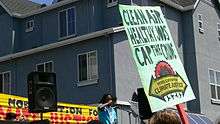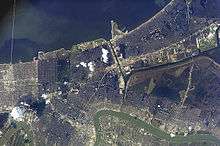Climate justice
Climate justice is a term used for framing global warming as an ethical and political issue, rather than one that is purely environmental or physical in nature. This is done by relating the effects of climate change to concepts of justice, particularly environmental justice and social justice and by examining issues such as equality, human rights, collective rights, and the historical responsibilities for climate change. A fundamental proposition of climate justice is that those who are least responsible for climate change suffer its gravest consequences.[1][2][3] Occasionally, the term is also used to mean actual legal action on climate change issues.[4]
Reasons for the differential effects of climate change

The ability of populations to mitigate and adapt to the negative consequences of climate change are shaped by factors such as income, race, class, gender, capital and political representation.[5] As low-income communities and communities of color possess few if any adaptive resources, they are particularly vulnerable to climate change.[5][6] People living in poverty or in precarious circumstances tend to have neither the resources nor the insurance cover necessary to bounce back from environmental disasters. On top of that, such populations often receive an unequal share of disaster relief and recovery assistance.[5]
History of the term's use
In 2000, at the same time as the Sixth Conference of the Parties (COP 6), the first Climate Justice Summit took place in The Hague. This summit aimed to "affirm that climate change is a rights issue" and to "build alliances across states and borders" against climate change and in favor of sustainable development.[7]
Subsequently, in August–September 2002, international environmental groups met in Johannesburg for the Earth Summit.[8] At this summit, also known as Rio+10, as it took place ten years after the 1992 Earth Summit, the Bali Principles of Climate Justice[9] were adopted.
Climate Justice affirms the rights of communities dependent on natural resources for their livelihood and cultures to own and manage the same in a sustainable manner, and is opposed to the commodification of nature and its resources.
Bali Principles of Climate Justice, article 18, August 29, 2002 [10]
In 2004, the Durban Group for Climate Justice was formed at an international meeting in Durban, South Africa. Here representatives from NGOs and peoples’ movements discussed realistic policies for addressing climate change.[11]
At the 2007 Bali Conference, the global coalition Climate Justice Now! was founded, and, in 2008, the Global Humanitarian Forum focused on climate justice at its inaugural meeting in Geneva.[12]
In 2009, the Climate Justice Action Network was formed during the run-up to the Copenhagen Summit.[13] It proposed civil disobedience and direct action during the summit, and many climate activists used the slogan 'system change not climate change'.[14]
In April 2010, the World People's Conference on Climate Change and the Rights of Mother Earth took place in Tiquipaya, Bolivia. It was hosted by the government of Bolivia as a global gathering of civil society and governments. The conference published a "People's Agreement" calling, among other things, for greater climate justice.[15]
Developed countries, as the main cause of climate change, in assuming their historical responsibility, must recognize and honor their climate debt in all of its dimensions as the basis for a just, effective, and scientific solution to climate change. (...) The focus must not be only on financial compensation, but also on restorative justice, understood as the restitution of integrity to our Mother Earth and all its beings.
World People’s Conference on Climate Change and the Rights of Mother Earth, People's Agreement, April 22, Cochabamba, Bolivia [10]
Controversial interpretations of climate justice
One contentious issue in debates about climate justice is the extent to which capitalism is viewed as its root cause. This question frequently leads to fundamental disagreements between, on the one hand, liberal and conservative environmental groups and, on the other, leftist and radical organizations. While the former often tend to blame the exesses of neoliberalism for climate change and argue in favor of market-based reform, the latter view capitalism with its exploitative traits as the underlying central issue.[16][17]
Hurricane Katrina case study

According to one study, Hurricane Katrina provided insights into how climate change disasters affect different people differently,[5] as it had a disproportionate effect on low-income and minority groups.[5] A study on the race and class dimensions of Hurricane Katrina suggests that those most vulnerable include poor, black, brown, elderly, sick, and homeless people.[18] Low-income and black communities had little resources and limited mobility to evacuate before the storm.[19][20] Also, after the hurricane, low-income communities were most affected by contamination,[5] and this was made worse by the fact that government relief measures failed to adequately assist those most at risk.[6][18]
Legal actions on climate change issues
Against states
Netherlands
In 2012, the Dutch lawyer Roger Cox gave the idea of judicial intervention to force action against climate change.[21][22] In 2013, the Urgenda Foundation, with 900 co-plaintiffs, has filed a lawsuit against the Government of the Netherlands "for not taking sufficient measures to reduce greenhouse gas emissions that cause dangerous climate change".[21]
In 2015, the District Court of The Hague ruled that the government of the Netherlands must do more to reduce greenhouse gas emissions to protect its citizens from climate change (Urgenda climate case).[21][23][24] It was described as a "precedent-setting judgment"[23] and as the "world’s first climate liability suit".[24]
According to James Thornton, chief executive of Client Earth, "Most remarkably, it is based in essence on established science and the ancient principle of a government's duty of care. That reasoning is applicable in any legal system and will certainly be used by courts in other countries".[23][25]
Others
After the landmark ruling of the Netherlands in 2015, groups in other countries tried the same judicial approach.[26] For instance, groups when to court in order to protect people from climate change in Belgium,[23] Switzerland[27] and the United States.[26][28]
Against companies
In the United States, Friends of the Earth, Greenpeace together with the cities of Boulder, Arcata and Oakland won against the Export-Import Bank of the United States and the Overseas Private Investment Corporation (state-owned enterprises of the United States government), which were accused of financing fossil-fuel projects detrimental to a stable climate, in violation of the National Environmental Policy Act (case filed in 2002 and settled in 2009).[29][30][31]
In 2016, a government body of the Philippines (the Commission on Human Rights) launched an official investigation concerning climate change against 47 of the world's largest carbon producers.[28][32]
See also
- Social justice
- Environmental justice
- Environmental racism
- Environmental racism in Europe
- Climate debt
- Ecological debt
- Environmentalism
- Ecology
- Global Justice Movement
- Deliberative democracy
- Earth Summit
- Equity
- Greenhouse Development Rights
- Green banking
References
- ↑ Global Humanitarian Forum (1 October 2009) Kofi Annan launches climate justice campaign track, Global Humanitarian Formum, October 1, 2009
- ↑ Wendy Koch, Study: Climate change affects those least responsible, USA Today, March 7, 2011
- ↑ Africa Speaks up on Climate Change This appeal states: "In wealthy countries, the looming climate crisis is a matter of concern, as it will affect the wellbeing of the economy. But in Africa, which is hardly contributing to climate change in the first place, it will be a matter of life and death."
- ↑ See, for example the Climate Justice Programme's Climate Law Database.
- 1 2 3 4 5 6 Christian-Smith, Juliet; Peter H. Gleick; Heather Cooley; et al. (2012). A twenty-first century US water policy. Oxford: Oxford University Press. ISBN 9780199859443.
- 1 2 Mohai, Paul; Pellow, David; Roberts, J. Timmons (2009). "Environmental Justice". Annual Review of Environment and Resources. 34 (1): 405–430. doi:10.1146/annurev-environ-082508-094348.
- ↑ CorpWatch: Alternative Summit Opens with Call for Climate Justice, November 19, 2000
- ↑ website worldsummit2002.org (archive)
- ↑ Bali Principles of Climate Justice, PDF, August 29, 2002
- 1 2 Black 2005, p. 19.
- ↑ Durban group for Climate Justice
- ↑ The Global Humanitarian Forum Annual Meeting 2008
- ↑ Climate Change and Justice: On the road to Copenhagen, Heinrich Böll Foundation
- ↑ 100,000 march for System Change not climate change in Copenhagen with mass arrests Indymedia, December 13, 2009
- ↑ World People’s Conference on Climate Change and the Rights of Mother Earth, People's Agreement April 22, Cochabamba, Bolivia
- ↑ Space for Movement: Reflections from Bolivia on climate justice, social movements and the state PDF, edited by Building Bridges collective, July 2010, ISBN 978 0 85316 294 0
- ↑ Is a Successful Ecological Turnaround of Capitalism Possible?
- 1 2 Giroux, Henry A. (2006). "Reading Hurricane Katrina: Race, Class, and the Biopolitics of Disposability". College Literature. 33 (3): 171–196. doi:10.1353/lit.2006.0037.
- ↑ Elliott, James R.; Pais, Jeremy (2006). "Race, class, and Hurricane Katrina: Social differences in human responses to disaster". Social Science Research. 35 (2): 295–321. doi:10.1016/j.ssresearch.2006.02.003.
- ↑ Masozera, Michel (2007). "Distribution of impacts of natural disasters across income groups: A case study of New Orleans". Ecological Economics. 63 (2-3): 299–306. doi:10.1016/j.ecolecon.2006.06.013.
- 1 2 3 Urgenda climate case, Urgenda Foundation (page visited on 6 November 2016).
- ↑ Roger Cox, "It is time for the judiciary to step in and avert climate catastrophe", The Guardian, 14 November 2012 (page visited on 6 November 2016).
- 1 2 3 4 Quirin Schiermeier, "Landmark court ruling tells Dutch government to do more on climate change", Nature, 24 June 2015 (page visited on 5 November 2016).
- 1 2 Arthur Neslen, "Dutch government ordered to cut carbon emissions in landmark ruling", The Guardian, 24 June 2015 (page visited on 5 November 2016).
- ↑ It is also supported by the Oslo Principles on Global Climate Change Obligations. See Julia Powles and Tessa Khan, "Climate change: at last a breakthrough to our catastrophic political impasse?", The Guardian, 30 March 2015 (page visited on 6 November 2016).
- 1 2 "The Climate Justice movement across the globe", Greenpeace, 19 August 2015 (page visited on 6 November 2016).
- ↑ Ainées pour la protection du climat, 2016 (page visited on 5 November 2016).
- 1 2 John Vidal, "World's largest carbon producers face landmark human rights case", The Guardian, 27 July 2016 (page visited on 6 November 2016).
- ↑ Douglas Starr, "The carbon accountant. Richard Heede pins much of the responsibility for climate change on just 90 companies. Others say that's a cop-out", Science, volume 353, issue 6302, 26 August 2016, pages 858-861.
- ↑ Litigation related to climate change, IPCC Fourth Assessment Report: Climate Change 2007, Intergovernmental Panel on Climate Change (page visited on 30 November 2016).
- ↑ Order Denying Defendants' Motion for Summary Judgment, in the case of Friends of the earth, Greenpeace, Inc. and City of Boulder Colorado versus Peter Watson (Overseas Private Investment Corporation) and Phillip Lerrill (Export-Import Bank of the United States), No. C 02-4106 JSW, United States District Court for the Northern District of California, 2005 (page visited on 30 November 2016).
- ↑ Petition Requesting for Investigation of the Responsibility of the Carbon Majors for Human Rights Violations or Threats of Violations Resulting from the Impacts of Climate Change, Commission on Human Rights of the Philippines, 2016 (page visited on 30 November 2016).
Further reading
- Bali Principles of Climate Justice
- Institute for International Integration Studies
- Space for Movement? Reflections from Bolivia on climate justice, social movements and the state, PDF, edited by Building Bridges collective, July 2010, ISBN 978 0 85316 294 0
- Climate Change and Justice: On the road to Copenhagen, PDF, Heinrich Böll Foundation, Berlin 2009
- Broome, J. (2006). "Valuing policies in response to climate change: some ethical issues" (PDF). HM Treasury. Retrieved August 28, 2009.
- Africa Speaks up on Climate Change, PDF, Heinrich Böll Foundation, Nairobi 2007
- FOE Australia Climate Justice Position Paper, December 16, 2006
- Vandana Shiva - 2005, Earth Democracy; Justice, Sustainability, and Peace, South End Press, ISBN 0-89608-745-X
- Geoffrey Pleyers, Climate Justice in the global age: a social movement perspective, ISA-Sage, 2015